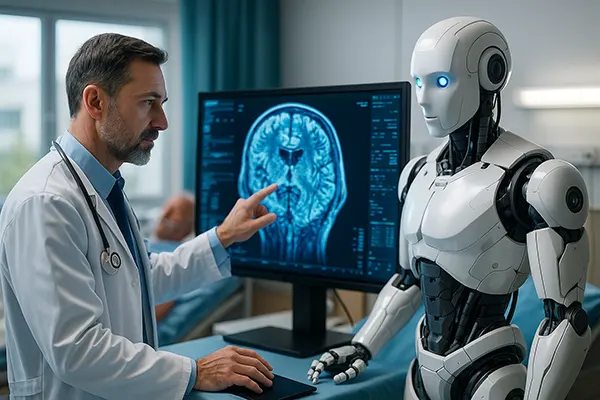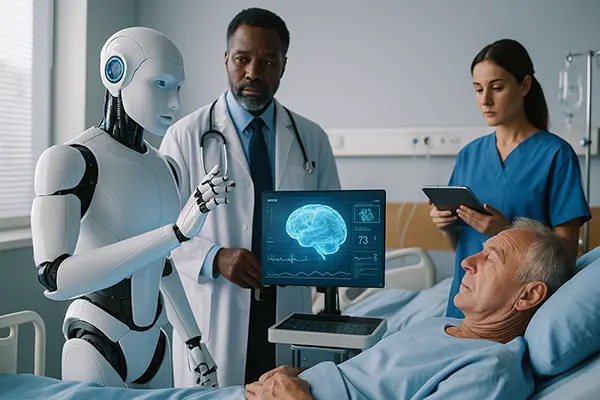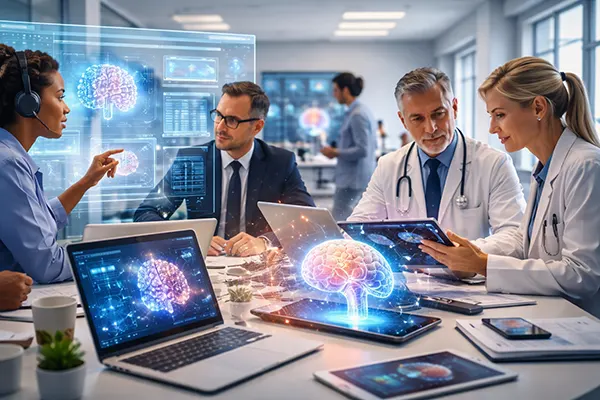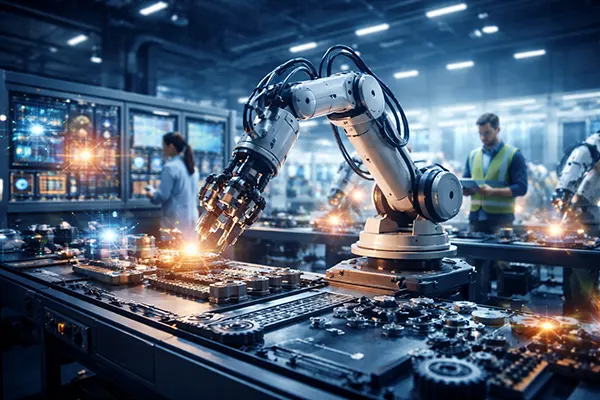
Artificial Intelligence in Medicine: How AI Saves Lives, Not Just Generates Texts
Artificial intelligence has already transformed countless industries, but its greatest impact is unfolding within healthcare. Beyond writing texts or analysing data, AI is saving lives by diagnosing diseases earlier, optimising treatment plans, and assisting doctors in real time. In 2025, the medical world no longer views AI as a futuristic tool but as a critical partner in patient care.
AI Diagnostics and Early Detection
One of the most powerful contributions of artificial intelligence lies in medical diagnostics. Algorithms now interpret radiological images, detect tumours at earlier stages, and identify patterns invisible to the human eye. For instance, systems based on deep learning are capable of detecting breast cancer or lung nodules from CT scans with accuracy surpassing human radiologists in certain cases.
In 2025, hospitals across Europe and the UK are increasingly using AI-assisted radiology. The National Health Service has introduced diagnostic AI tools that can analyse thousands of X-rays in minutes, helping doctors prioritise urgent cases. This approach reduces waiting times and increases survival rates for critical conditions such as stroke or cardiac arrest.
Moreover, AI systems now analyse genetic data to predict an individual’s risk of developing hereditary diseases. By combining genomic sequencing with machine learning, researchers are developing predictive models for cancer, diabetes, and Alzheimer’s disease, enabling prevention long before symptoms appear.
Transforming Clinical Decision-Making
Artificial intelligence supports clinicians by analysing medical records, laboratory data, and real-time monitoring results. Instead of replacing human expertise, AI enhances it — providing evidence-based recommendations and detecting anomalies faster than manual analysis. Decision support systems like IBM Watson Health and Google DeepMind assist doctors by suggesting diagnoses or highlighting treatment options backed by the latest research.
For example, DeepMind’s partnership with Moorfields Eye Hospital in London has created an AI model that identifies over fifty eye diseases from retinal scans, reducing diagnostic errors and ensuring timely treatment. Similar solutions are being implemented in cardiology, where AI detects arrhythmias from ECG data and predicts heart attacks before they occur.
This intelligent assistance also helps in managing hospital workflows. AI can forecast patient admissions, monitor bed availability, and optimise resource allocation — ensuring that emergency departments operate efficiently even under pressure.
AI in Personalised Treatment
The era of one-size-fits-all medicine is fading. Artificial intelligence makes it possible to tailor treatments to the unique characteristics of each patient. Using predictive analytics, AI evaluates how different individuals respond to drugs, adjusting dosages and combinations for maximum effect while minimising side effects.
In oncology, AI tools analyse tumours’ molecular profiles and recommend targeted therapies. Systems like Tempus and Foundation Medicine have integrated AI to match patients with clinical trials or experimental treatments based on their genetic data. Such precision medicine significantly improves the chances of recovery, particularly for rare or complex cancers.
AI-driven robotics are also transforming surgery. Robotic systems like the da Vinci Surgical System use AI algorithms to enhance precision, allowing surgeons to perform minimally invasive procedures with smaller incisions and faster recovery times. In 2025, robotic-assisted surgeries are becoming standard in leading hospitals across the UK and Europe.
Enhancing Rehabilitation and Patient Monitoring
Beyond hospitals, artificial intelligence plays a vital role in rehabilitation and long-term care. AI-powered wearable devices monitor patients’ heart rate, oxygen levels, and physical activity in real time, alerting healthcare providers to potential health risks. These systems have proven crucial for patients recovering from strokes, heart surgery, or chronic illnesses.
Virtual assistants integrated into mobile health apps guide patients through exercises, track medication adherence, and provide emotional support. In elderly care, AI helps detect falls, irregular movements, or cognitive decline, ensuring timely intervention and improving quality of life.
In mental health, AI chatbots and therapeutic applications now use natural language processing to recognise emotional distress and offer immediate coping strategies. While they cannot replace psychologists, they ensure that early help is available around the clock.

Ethical Standards and the Future of AI in Medicine
With growing adoption comes the responsibility to ensure ethical use of artificial intelligence in healthcare. The UK’s NHS and the European Medicines Agency have established clear frameworks for data privacy, algorithm transparency, and accountability. These standards ensure that AI remains a supportive instrument rather than a replacement for human judgment.
Data security is a key concern in 2025. AI relies on vast amounts of patient information, making encryption and anonymisation essential. Medical institutions are investing heavily in secure cloud infrastructures to prevent breaches and maintain public trust. Ethical committees now evaluate each AI tool before clinical use, guaranteeing that it meets safety and fairness criteria.
Looking ahead, artificial intelligence is expected to deepen its role in preventive medicine and remote diagnostics. As quantum computing and multimodal AI systems evolve, the accuracy and scope of medical prediction will reach unprecedented levels. Yet, human empathy and ethical responsibility will remain the cornerstone of healthcare, no matter how advanced technology becomes.
Building Trust Between AI and Humanity
To fully integrate AI into healthcare, trust must be established between technology and patients. Transparent communication about how algorithms work and what data they use is crucial. Patients should always have access to explanations and the option to choose human-based care when desired.
Healthcare professionals also require continuous training. Understanding AI’s strengths and limitations allows doctors to interpret its recommendations correctly and maintain accountability. The goal is collaboration, not substitution — a partnership where AI empowers doctors to deliver safer, faster, and more personalised care.
Ultimately, artificial intelligence is redefining medicine by bridging the gap between technology and compassion. In 2025, it is not just a tool that generates text or processes data — it is an ally that saves lives, offering humanity a future where precision and empathy coexist.





